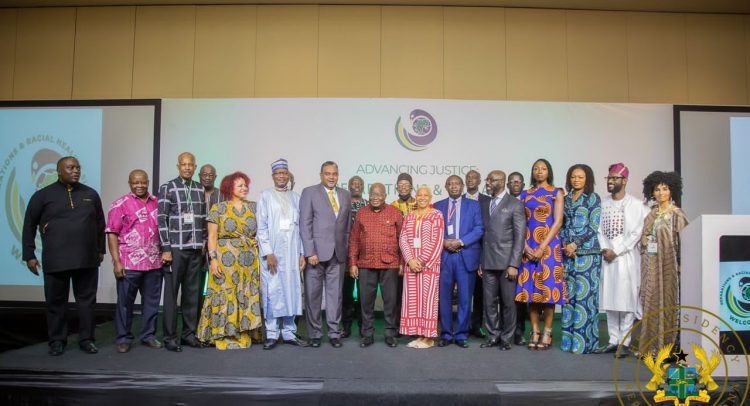Slavery reparations for Africa long overdue—President Akufo-Addo
President Nana Addo Dankwa Akufo-Addo says reparations for Africans and people of African descent who suffered the heinous Trans-Atlantic Slavery Trade was long overdue.
He said though no amount of money could restore the damage caused by the Trans-Atlantic Slave Trade and its consequences, which have spanned many centuries, “nevertheless, it is now time to revive and intensify the discussions about reparations for Africa. Indeed, the time is long overdue.”
Speaking at the opening of the four-day Reparations and Racial Healing Summit in Accra on Monday, the President said the effects of the Slave Trade had been devastating to the African continent and to the African Diaspora, with the entire period of slavery stifling Africa’s economic, cultural and psychological progress.
He regretted that the subject of reparations “becomes a debate” only when it comes to Africa and Africans.
President Akufo-Addo noted that when the British ended slavery, all the owners of enslaved Africans received reparations to the tune of twenty million pounds sterling, the equivalent today of twenty billion pounds sterling, but enslaved Africans themselves did not receive a penny.
Likewise, in the United States, owners of slaves received three hundred dollars for every slave they owned; the slaves themselves received nothing. In the case of Haiti, the country had to pay reparations amounting to twenty-one billion dollars to French slaveholders in 1825 for the victory of the great Haitian Revolution, the first in the Americas and the Caribbean, which freed
the slaves.
“Native Americans have received and continue to receive reparations; Japanese-American families, who were incarcerated in internment camps in America during World War II, received reparations. Jewish people, six million of whom perished in the concentration camps of Hitlerite Germany, received reparations, including homeland grants and support.
“So, it is time for Africa, twenty million of whose sons and daughters had their freedoms curtailed and sold into slavery, also to receive reparations,” the President underscored.
President Akufo-Addo asked participants at the Summit not to overly concern themselves with modalities for the payment of reparations but, rather, to work to establish, unequivocally, first the justice in the call for reparations.
“And, even before these discussions on reparations conclude, the entire continent of Africa deserves a formal apology from the European nations involved in the slave trade for the crimes and damage it has caused to the population, psyche, image and character of the African the world over,” he stated.
The President urged the African Union to engage with “our kith and kin from the diaspora” and form a united front to advance the cause of reparations.
“The discourse on reparations cannot succeed without emphasis on racial healing. We need to heal from the wrongs of the past in order to capitalise on the opportunities that await us in the future,” he added.
The summit is being co-hosted by the African Union Commission, the African Transitional Justice Legacy Fund9ATJLF), the African-American Institute and the Global Black, with funding from John D. and Catherine T. MacArthur Foundation.
It would discuss and examine options for addressing the reparation intervention gaps in the world and fashion a comprehensive strategy and agenda to unify transcontinental plans for reparations.
The Summit would also provide the opportunity for various actors on the continent and from the Diaspora to commit to redefining strategy, build bridges and engender trust in the global campaign.
It would also explore healing approaches from the continent as well as begin a dialogue process that would unpack the role of Africans in the slave trade, as well as define agreeable areas of collective advocacy and new approaches for racial communal healing.



